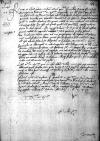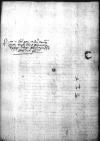List #208
Ioannes DANTISCUS do Piotr TOMICKIVillach, 1524-04-08
Rękopiśmienne podstawy źródłowe:
Pomocnicze podstawy źródłowe:
Publikacje:
| ||||||||||||||||||||||||
Tekst + aparat krytyczny + komentarz Zwykły tekst Tekst + komentarz Tekst + aparat krytyczny Ekscerpty dotyczące podróży Dantyszka
Reverendissimo in Christo Patri,
Reverendissime in Christo Pater et Domine, domine gratiosissime, humillimam commendationem.
Novissimis litteris Dominationis Vestrae Reverendissimae respondi, non tamen quantum opus fuit, credebam enim ex
Litterae Dominationis Vestrae Reverendissimae, quae in
Aliud nunc non restat, quam quod Dominatio Vestra Reverendissima me suum servum perpetuum ea, qua cepit, gratia prosequatur, et si se casus obtulerit, Iodoci non obliviscatur. Magnificus dominus collega meus, quem Dominationi Vestrae Reverendissimae deditissimum cognovi, illi se maximopere commendat.
Datum ex oppido
Dominationis Vestrae Reverendissimae humillimus servus,

